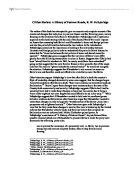In his younger years, Kopelev admits he unquestioningly pursued “the universal triumph of communism”. Initially, he admits that “with the rest of [his] generation [he] believed that the ends justified the means”. He explains that he felt it his “duty” to fight for their cause. Clearly, their cause had great support. Koplelev maintains that widespread support for the cause was slow to die. He claims that even in the event of a war in the early 1950s, many still would have fought for Stalin and country. Yet, as an eyewitness to unnecessarily induced famines and exploitation, and as an executor of “cruel acts”, Kopelev concluded that, the end did not in fact justify the means. Despite such cruelty, however, Kopelev still believed that the Marxist roots of communism could deliver a better world for all. His belief in the achievement of a classless society was evidently unwavering, like many of his contemporaries.
For expressing his humanitarian perspective of what Stalin’s communism was doing to his country and his people, Kopelev served 9 years in a Soviet labour camp. Upon his arrest for the trumped up charge of “propaganda of bourgeois humanism and pity for the enemy”, Kopelev remained confused. He was adamant that he was still behind the cause, but clearly his peers disagreed and saw him as a threat to communism. Indeed, it is unlikely that a Major in the Red Army would suddenly reject the ideals that he was fighting for, and had allowed him to achieve such a high ranking position. This demonstrates how spirit for a cause can quickly be turned into paranoid fanaticism. The perspective Kopelev writes demonstrates how he does not condemn his arresters. Rather he acknowledges that people had become so caught up in trying to achieve a better life that they had forgotten any sensibility they may have once had. McAuley (1992) substantiates this lack of sensibility with a list of accounts of similar arrests.
As this document was written some years after the event (despite still being a primary source), it is less clear who Kopelev is writing for. Since Kopelev was writing during the Cold War, it is likely that he was trying to convince the capitalist world that there should be no fear of communism. During the Cold War, the West feared that communism would take over the world (Hobsbawm, 2001). China, Cuba and several African colonies had fallen to communism leading into the 1970s when “The Party Faithful” was written, and the West was understandably edgy (Hobsbawm, 2001). Kopelev’s call for “a new system of Marxist ethics” proves his belief in the inherent intentions of communism, but also suggests that the implementation of Marxist ethics requires a far better regime than Stalin’s. Kopelev’s recurring references to how strong the support for communism was would also suggest to the Cold War audience that the cause had much merit.
‘The Party Faithful’ reveals how single minded Soviets were to achieving communism. According to Kopelev, their ultimate intention of delivering a society based on equality was farcical, considering the means they were using to achieve it. Although Kopelev acknowledges that he remains a communist despite his arrest and expulsion from the Communist Party, it should be noted that he had mostly (if not only) ever lived under communist rule. Thus, he had never really witnessed any alternative. This indicates how single minded Kopelev was, despite his claim that he saw a broader humanitarian picture than his contemporaries. Consequently, his bias for communism is evident. Given the timeframe this piece was written, it is likely Kopelev was attempting to rekindle the communist fire. However, it is also possible that another motive for writing this document was to explain to his remaining peers why he was imprisoned.
“The Party Faithful” uses simple language, but largely preys on the emotions of the audience. Kopelev portrays the efforts of his peers during the war as “heroic”, “triumph[al]”, and “misunderstood”, so as not to taint the image of communism. Nonetheless, the document is quite apt in convincing the audience that communism was not ideologically evil.
This document is excellent in demonstrating how brainwashed Soviets became in their quest for communism. Kopelev shows the irony of the Bolsheviks attempts to ultimately improve life while actually making it much worse. As a snapshot of the chaotic Soviet period, this document shows how fanaticism for a cause can send the cause far off track. It also provides an understanding of how uniquely terrifying and harsh this period was.
References
-
Baykov, A. The Development of the Soviet Economic System, Cambridge University Press, Cambridge, 1946
-
Hobsbawm, E. Age of Extremes, Abacus, Great Britain, 3rd Ed., 2001
-
Kopelev, L. No Jail for Thought, English Ed, Secker and Warburg, London, 1977.
-
McAuley, M. Soviet Politics, 1917-1991, Oxford University Press, Oxford, 1992







